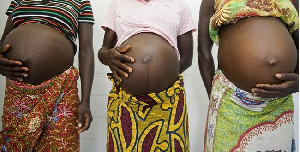Health News of Friday, 8 March 2024
Source: www.ghanaweb.live
2024-03-08Ghana's teenage pregnancy rate: 15.2% of female adolescents affected
 Approximately 15.2% of Ghanaian female adolescents aged 15-19 have experienced pregnancy
Approximately 15.2% of Ghanaian female adolescents aged 15-19 have experienced pregnancy
Roughly 15.2% of Ghanaian female adolescents aged 15-19 have encountered pregnancy, indicating a prevalent issue of teenage motherhood nationwide.
This proportion constitutes nearly one-fifth of the global occurrence, underscoring its substantial impact on this demographic.
Regional disparities are evident, with teenage pregnancy rates ranging from 6% in Greater Accra to 26% in the Savannah Region, highlighting varying degrees of
Read full articleprevalence.
Despite concerns, there has been a decline in teenage motherhood from 19% to 11% since 1988, indicating some progress over the years.
These revelations surfaced during a zonal dissemination event of the Ghana 2022 Demographic and Health Survey, shedding light on the multifaceted landscape of adolescent pregnancy and motherhood across different regions.
The Ashanti region follows closely behind with a 24% incidence of adolescent pregnancies.
The dissemination of the 2022 Demographic and Health Survey brought together health experts, district, and assembly health executives to delve into the implications of the survey’s findings.
Sarah Woode, Head of the Social Statistics Section at the Ghana Statistical Service, expressed concern, stating, “It is concerning to witness a high prevalence of young women becoming pregnant within that age bracket."
"This calls for urgent attention from policymakers," she added.
The Ghana 2022 Demographic and Health Survey acts as a comprehensive study aimed at monitoring and evaluating healthcare service utilization and management across all 16 regions of the country.
Over a five-week period, the dissemination exercise focused on data collected from 15 key areas, encompassing child health, malaria, infant and child mortality, HIV/AIDS, and health insurance.
Furthermore, the survey delved into subjects like marriage, fertility, family planning, water and sanitation, women’s empowerment, domestic violence, and consent.
Emmanuel George Osei, Director of Regional Offices at the Ghana Statistical Service, emphasized the report's significance as a crucial resource for the Ministry of Health, enabling the assessment of health program outcomes and impacts.
"Health facilities rely heavily on our data. This informs policy evaluation and formulation regarding health issues in the country. The Ghana Health Service and the Ministry of Health can leverage this information accordingly," he remarked.











